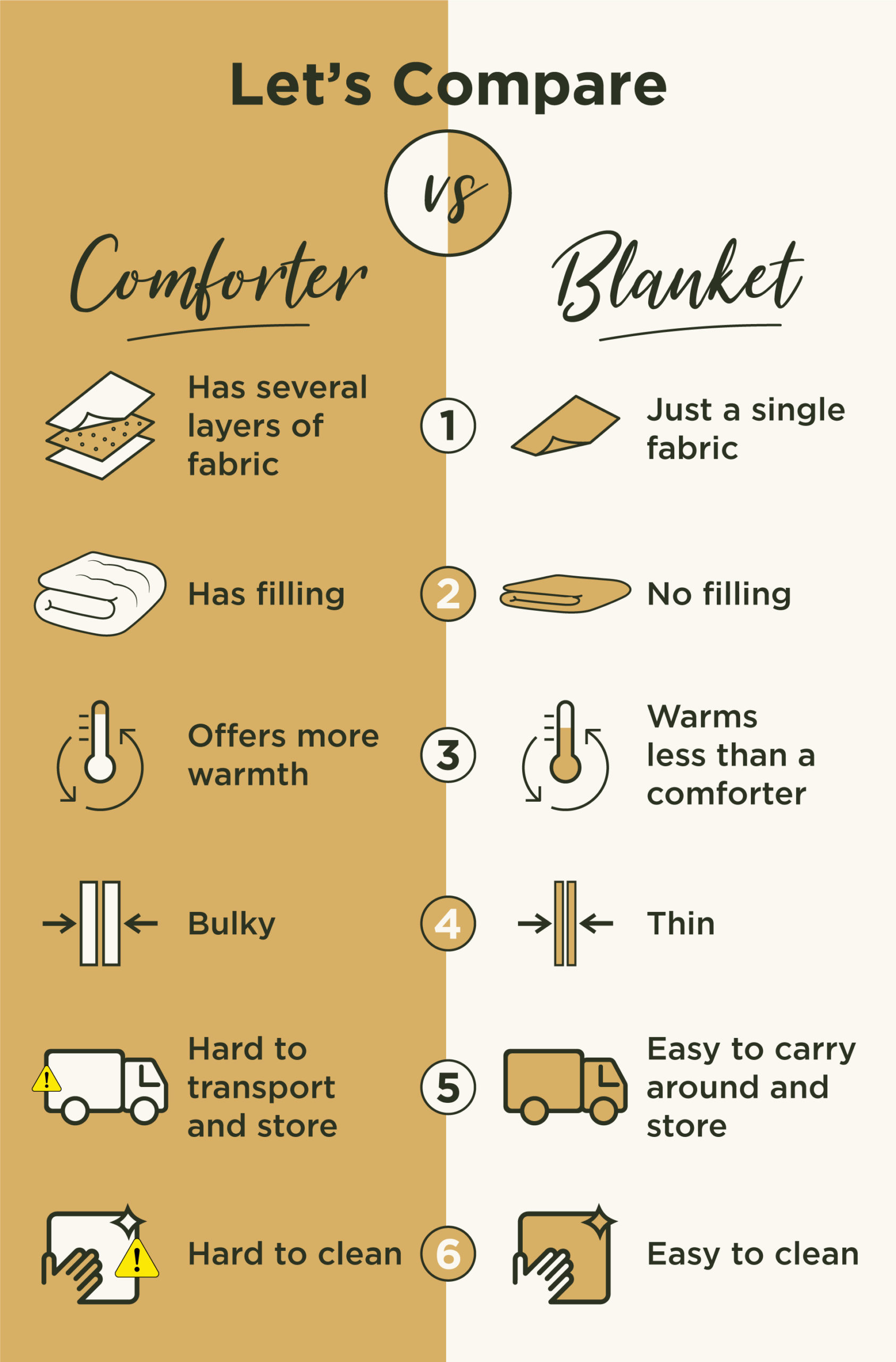Comforter Vs Blanket
When you’re on a quest to curate your optimal sleeping conditions, your bedding often takes priority. As it should! The right bedding can go a long way in ensuring a comfortable night’s sleep.
Have you been digging into the comforter vs. blanket debate to narrow down your choices?
Good! There’s a LOT you need to know.
We often use the two terms interchangeably, but comforters and blankets have some crucial differences that may impact your sleep.
In this article, we will explore how comforters differ from blankets to help you decide which would best suit your needs.
Difference Between A Comforter Vs. Blanket
What’s the difference between a comforter and a blanket? Both are types of bedding that provide warmth and decoration, but they differ in a number of other aspects.
Functionality
The functionalities of a comforter vs. a blanket are not too different. Both blankets and comforters warm you up. However, a blanket offers more flexibility in usage since you can carry and use it anywhere. A comforter, on the other hand, is harder to transport, takes up more space, and is typically only used in a bedroom.
Filling Material
Blankets are made of a single fabric, whereas comforters have fillings, such as wool, down, feathers, cotton, silk, and polyester.
Because of this, a comforter’s heating ability is higher than a blanket’s. However, given the different types of fillings, there’s also a greater risk of allergies with comforters.
So, when comparing blanket vs. comforter warmth, you will need to consider the material and thickness of the blanket and the filling of the comforter.
Resistance To Dust Mites And Other Allergens
Comforters have filling inside, which can collect dust and dust mites. The filling may also spill out and affect those allergic to it.
Blankets don’t have a filling and are made of a material that is not usually allergenic. If you are using a comforter, it is best to pair it with a cover.
Warmth Level
In terms of comforter vs. blanket for heat retaining, comforters are warmer than blankets. This is because comforters have filling while blankets don’t.
Blankets are usually thinner than comforters, so heat escapes through their fabric more easily.
Some blanket fabrics, such as fleece or wool, however, can be as warm as a regular comforter. So, when you’re trying to decide between a fleece blanket vs. comforter, for example, consider its weight, too.
Maintenance
Comforters are trickier to maintain because of their filling. They need special care and a gentler wash cycle. You will also need to check for tears to prevent the filling from coming out during the wash. Comforters with certain kinds of filling, such as down or feathers, also require extra care.
Blankets are easy to clean because of their simple structure and sturdy material. However, you must read the instruction labels on both to know how to maintain them.
Can’t decide between a down comforter vs. down blanket? Both are cozy, but in terms of ease of maintenance, a down blanket is the better choice.
Price
Prices of comforters can reach hundreds of dollars because of their material and filling.
Blankets are cheaper because it is much simpler to make them and their fabrics are less costly. If you want to get the warmth of a comforter but are sticking to a budget, consider buying multiple blankets. Their combined price may still be less than that of a comforter.
Storage and Care
Comforters are bulky, and folding them can take some effort. Blankets are thin and easier to fold and fit into small spaces.
The filling in comforters also makes them trickier to wash than blankets that are easier to clean and maintain.
Feel And Looks
Comforters are warmer and heavier than blankets because the filling adds thickness. However, some blankets are thick, and some comforters have a thin filling.
This thickness, however, also makes comforters harder to move around as they are more rigid than a blanket. In contrast, a blanket’s thinness makes it easier to maneuver.
In terms of comfort, the better choice will depend on the season. Between a blanket vs. comforter in summer, a blanket is more suitable.
Frequently Asked Questions
What Is A Comforter Blanket?
A comforter blanket is a blanket that is thicker than an average blanket. It has an extra layer of insulating material that adds to its warmth.
Comforter blankets are versatile because they can serve the purpose of both a comforter and a blanket. Some varieties are also reversible, which may help you delay washing it for a few days while also enjoying one blanket with two different designs.
Is A Comforter Better Than A Blanket?
Selecting one from a comforter vs. blanket will depend on your priorities. How much warmth do you need? Do you intend to use it somewhere other than in your room? What is your budget? Are you looking for something easy to wash?
The climate will also influence your choice. In the debate of blanket vs. comforter in summer, a blanket wins because a comforter’s warmth will be stifling during this time. A blanket is also ideal if the temperatures vary a lot.
It will also depend on the material. When you compare a wool blanket vs. comforter, think of how the wool will feel against your skin. Although wool is warming, low-quality wool blankets are scratchy and might pill or form balls when washed. A comforter solves this problem because even if it contains wool, it is covered by a layer of fabric, so you won’t feel it against your skin.
Ultimately, both blankets and comforters serve different purposes.
Which Is Warmer: Blanket Or Comforter?
A comforter can warm you more than a single blanket could, although some blankets are made thicker and may come close to a comforter’s warmth.
When you’re specifically considering comforter vs. blanket for winter, a comforter is more suitable. Although layering several thick blankets may also work.
It will also depend on the material. Between a wool blanket vs. comforter, the blanket may be the warmer choice if the comforter is of poor quality.
What Is The Purpose Of A Comforter?
As the name indicates, a comforter’s purpose is to comfort its user. It is an ideal choice for winter. Comforters come in different thicknesses to allow the users to choose one that provides just the right amount of heat.
When Should You Use A Blanket?
It would be best to use a blanket if:
- You are saving money
- You want something easily removable when it gets hot
- You want something easy to store and clean
- You have allergies
When selecting between a blanket vs. comforter, choose the blanket if you prioritize convenience and don’t require a high level of warmth.
What Are Some Alternatives For Comforters And Blankets?
Hate blankets or comforters? Try these instead:
Electric blankets: An electric blanket allows you to control its temperature to give you the ideal level of warmth.
Weighted blankets: If you use a comforter because it’s heavier and thus more comforting than a blanket, try weighted blankets. These can weigh up to 30 pounds and provide pressure therapy, which may help relieve pain, improve the quality of your sleep, and help reduce depression or anxiety.
What do you choose between a weighted blanket vs. comforter? If you are experiencing pain or psychological discomfort, ask your doctor whether a weighted blanket may help you. If the doctor approves it, a weighted blanket is a great choice because it’s better than a comforter in providing pressure therapy.
Top sheets: If warmth is not a necessity, use a top sheet. It is a thin, flat sheet of fabric that is typically used as a protective layer between you and the bedsheet or comforter.
Coverlet: The coverlet is placed on top of the bedsheet and beneath a duvet. Like a top sheet, a coverlet is a light blanket that you can use on warm nights.
Throws: A throw is almost the same as a blanket, but it is much smaller — enough only to cover one — and offers adequate warmth.
Quilt: A quilt is usually cooler than a comforter but warmer than a blanket. It is thinner than a comforter, so it’s easier to clean and store.
Duvet: To decide on a blanket vs. comforter vs. duvet, know that a duvet is like a comforter, but it is thicker and has a removable protective cover that is washed separately. This cover adds to the warmth of a comforter and keeps the filling inside.
The comforter vs. blanket debate essentially boils down to your personal preferences.
Remember that a comforter is more challenging to clean than a blanket, but it will warm you more, making it ideal during winter. On the other hand, a blanket is a more practical choice for summer when the temperature changes a lot.
Make sure you do your research and make an informed choice to find the best bedding to ensure a cozy, warm night of sleep.





